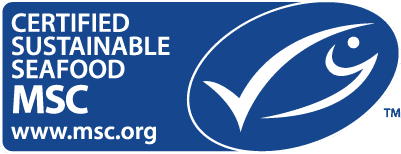WE ARE COMMITTED TO CREATING A BETTER FUTURE
Environment
SDG 6: Clean water and sanitation
We have a rainwater catchment tank; boreholes to meet our needs; a reverse osmosis system;
SDG 7: Affordable and clean energy
We are 22 per cent energy independent; we have around 1,700 solar panels; we use 100 per cent LED light bulbs;
SDG 9: Industry, innovation and infrastructure
We constantly invest in production equipment and digital transformation; we are certified according to ISO9001 + IFS;
SDG 11: Sustainable cities and communities
We are close to Lisbon; we are close to the labour market and support local institutions;
SDG 12: Responsible consumption and production
We use FSC cardboard packaging; we recycle cardboard and plastic packaging;
SDG 14: Life below water
In 2022 we tripled sales (in tonnes) of MSC/ASC certified products compared to 2020.
Social
SDG 1 and 2: No poverty and zero hunger
We donated more than 10,000 fish meals;
SDG 3: Good health and well-being
We promote health screenings; movement activities; psychology support; health insurance; support equipment;
SDG 4: Quality education
Internships; best student awards; partnerships with universities; industrial tourism; leadership academy; Duarte Tarré Association;
SDGs 5 and 10: Gender equality and reduced inequalities
Equal pay; diversity and complementarity of teams; middle management 50%M / 50%H; pensioners continue to be invited and take part in events;
SDG 8: Decent work and economic growth
Corporate culture; payment above the minimum wage; annual bonuses; employer branding.
Governance
SDG 16 and 17: Peace, justice and strong institutions and partnerships for the goals
Manuel Tarré is President of Ancipa and Alif, and Vice-President of CIP; Lídia Tarré is a member of the Board of Directors of the Association of Family Businesses and the Women Leaders Network.
Sustainable fishing in the care of marine resources and ecosystems
Sustainable fishing plays a crucial role in protecting marine resources and ecosystems, ensuring that different fish populations are managed responsibly, allowing them to regenerate naturally. It is essential for maintaining ocean balance and preserving their ecological functions for future generations. The sustainable approach reduces environmental impact, ensuring that fishing does not compromise biodiversity or the health of marine habitats. Initiatives such as those by the Marine Stewardship Council (MSC) raise awareness about the importance of consuming sustainably sourced seafood.
Importance of the Blue Label

The blue label, MSC, identifies seafood products that follow fishing practices that minimize damage to the ecosystem and protect endangered species. This helps ensure that fish populations remain healthy and available to meet the growing food demands of an expanding global population



